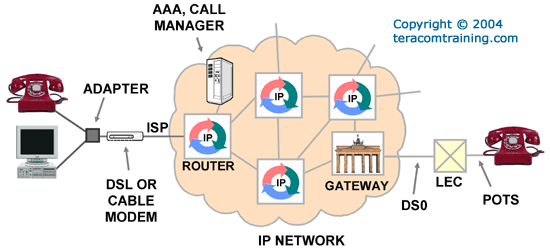Note: This is an archived article that appeared in the Teracom newsletter January 2004, and this article has not been updated to reflect technology developments since then. But reading it, we think you will agree that in hindsight, this analysis written in 2004 is highly accurate... and gives you a good idea of the quality and durability of Teracom's training courses. Be assured that our training courses have been updated since the time of this article!
Here's a summary of the ideas:
- User: VoIP over Cable or DSL
- ISP: Access network in metro area
- Long Distance: Internet or managed IP network
- Gateway to standard telephony at far end
- Packetizes voice
- Negotiates with call management servers
- Bypass the LEC at origination
- Bypass the regulators: "Internet" telephony
- More efficient use of LD trunks
Voice over IP over cable modem for telephone service is mainstream. This was essentially an initiative by the cable companies to move into the telephony business – while the telephone companies move into the cable TV business.

This service supports Plain Ordinary Telephone Service (POTS) at both ends. At the originating end, the user must have an adapter into which they plug their regular phone and their computer. This adapter in turn connects to the cable modem, which links the user to the cable TV company's access network in the metropolitan area. This access network is connected to the Local Exchange Carrier (LEC) to terminate local phone calls, and to an IP network for long distance.
In theory, the "long-distance IP network" is the Internet. If you are getting phone service from your cable company, this is unlikely, due to the total lack of Quality of Service (QoS) guarantees on the Internet and resulting total lack of guaranteed voice quality. It is much more likely that the calls will be carried over a managed IP network, which uses the same protocols as the Internet, but where the traffic, loading and quality are carefully controlled. The main tool for guaranteeing service levels is called MPLS.
If you are getting phone service from a third party, such as Vonage or Eric's Fly-By-Night Internet Phone Service, then the voice packets may well be delivered along with Internet traffic, where the service level is not guaranteed. It will probably sound good. Maybe not.
It is even possible that initially, the VoIP calls will be converted at the earliest opportunity to regular telephony and carried long-distance like any other telephone call. This would be the simplest and cheapest way to guarantee voice quality.
The IP network will have to provide a number of services, including Authorization, Accounting and Administration (AAA), call management features and gateways to convert the IP telephony to standard telephony for the far end.
This type of residential telephony is cheaper than POTS for a number of reasons:
First, the switched access charges added by the LEC to any long-distance phone call are avoided. Second, this service is being portrayed by the carriers as "Internet" telephony, avoiding regulation, fees and taxes imposed on POTS. Third, if variable-rate codecs are used, i.e. no packets are transmitted if no noise is coming out of the speaker's face, the long-distance trunk circuits are used more efficiently, thus costing less to the carrier.
This last point is the least important, as the wholesale cost of long-distance capacity is very close to zero due to recent technology-based exponential increases in capacity.









